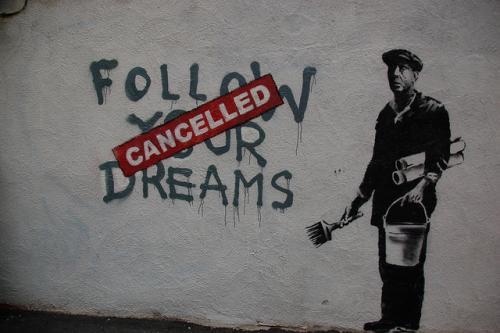
I’m not sure if it came from a guidance counselor or my parents or some sort of magical “install social norm” button, but somewhere along the lines I learned these things about professionalism:
- Dress appropriately
- Don’t curse
- Don’t interrupt
- Don’t question people above you in the hierarchy
These tips are subjective and truncated. I started thinking about how personality and professionalism tie together when I was a teenager. It’s been my habit to question social norms and the idea of “professionalism” always seemed like an authoritative view on the world of “work”.
In several communities, I’ve learned that personality and charisma trump this particular understanding of professionalism. Unfortunately, outside of the communities I circle around, I see a lot of judgment based on looks and/or communication methods.
If you’re smart, honest, authentic – it shouldn’t matter if you have a mohawk whether you’re an environmentalist or a banker. If you’re open-minded, hard-working and empathetic, it shouldn’t matter if you curse or use crude phrasing (philosophically it doesn’t matter anyway). If you’re sincere and tactful, you should be able to interrupt. You should always question authority.
I’m not saying everyone should run around willy nilly, swearing, yelling and generally being a nuisance. I’m simply proposing that we don’t waste time judging people on their looks or hating people because their communication style is brasher than what you’re used to. Let’s pay attention to personality traits and listen to what people are actually saying. If we’re still offended, maybe we can sit in that offense for a moment and ask ourselves why. Are we, ourselves, maybe reading into something? How are our own cultural and social upbringings affecting how we’re interpreting something?
Intelligent people don’t become enraged at differences in opinion. They consider these multiple viewpoints with an open mind and make decisions based on their understanding of the world. That doesn’t mean that they’ll change their minds, but they consider. Not all people are intelligent (I’m sorry to have to point this out). Rational arguments and discourse likely won’t change an unintelligent person’s mind. As a society, we have to deal with that.
We live in a politically correct world. People blame and judge and tell one another how they’re supposed to be. Who they’re supposed to be. Diversity and inclusion aren’t just about gender identity and race, they’re also about respecting diverse opinions and including varying perspectives in your mental models.
Don’t judge. Think about it.
Hi Laura, it would be difficult to argue with what you say here – especially given I’ve said before that professionalism, = doing a good job.
I do wonder, though, whether you’re letting some people off the hook a little? For example, it’s *not* OK if people hide emotional immaturity and misanthropy behind ‘communication style’.
Oh crap. Yeah, you’re correct (as per usual). I wanted to make a point quickly and thus didn’t dive into where personality stops and lack of emotional intelligence begins. If I shortly state that there are attributes of consideration and reflection in a professional, does it help?